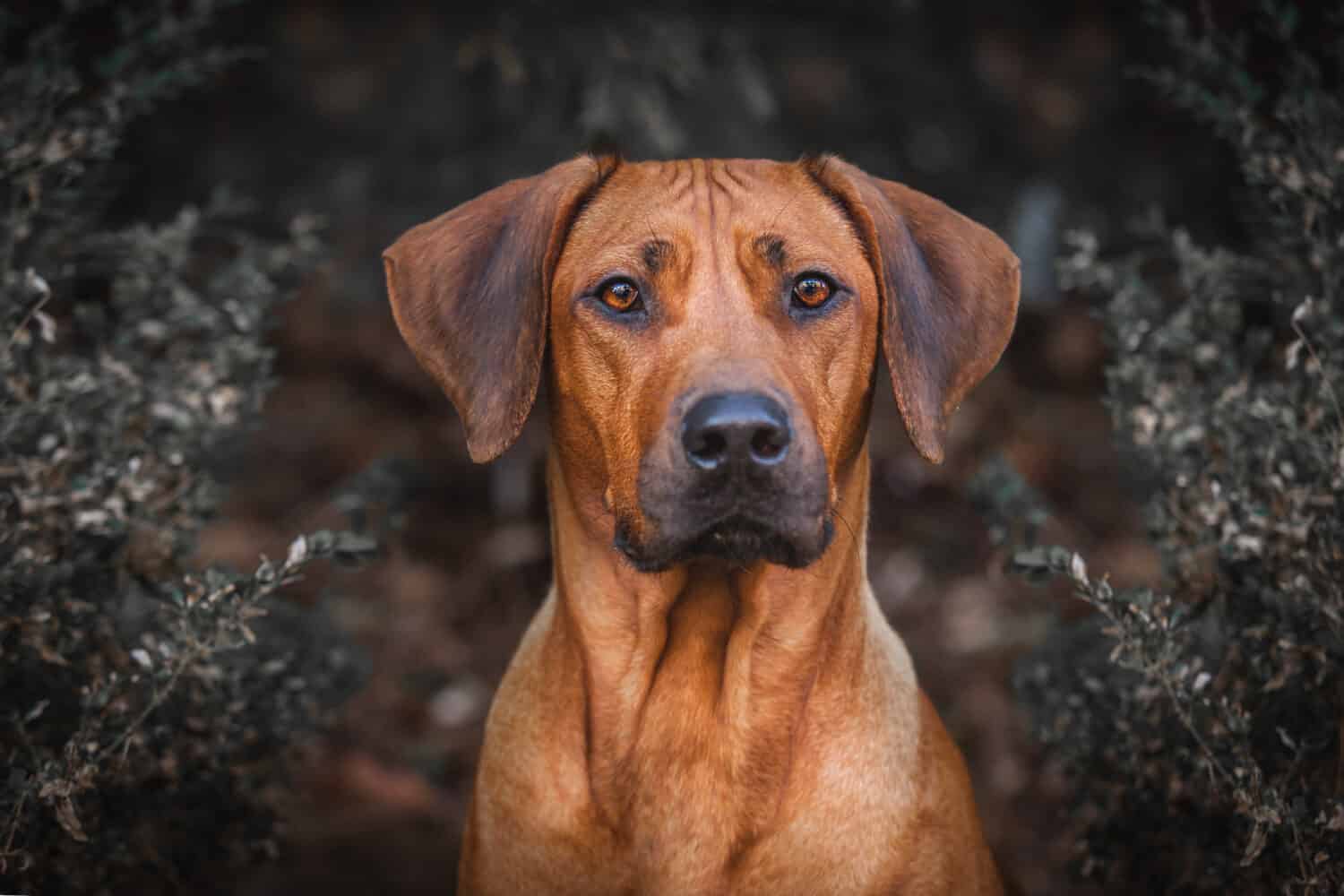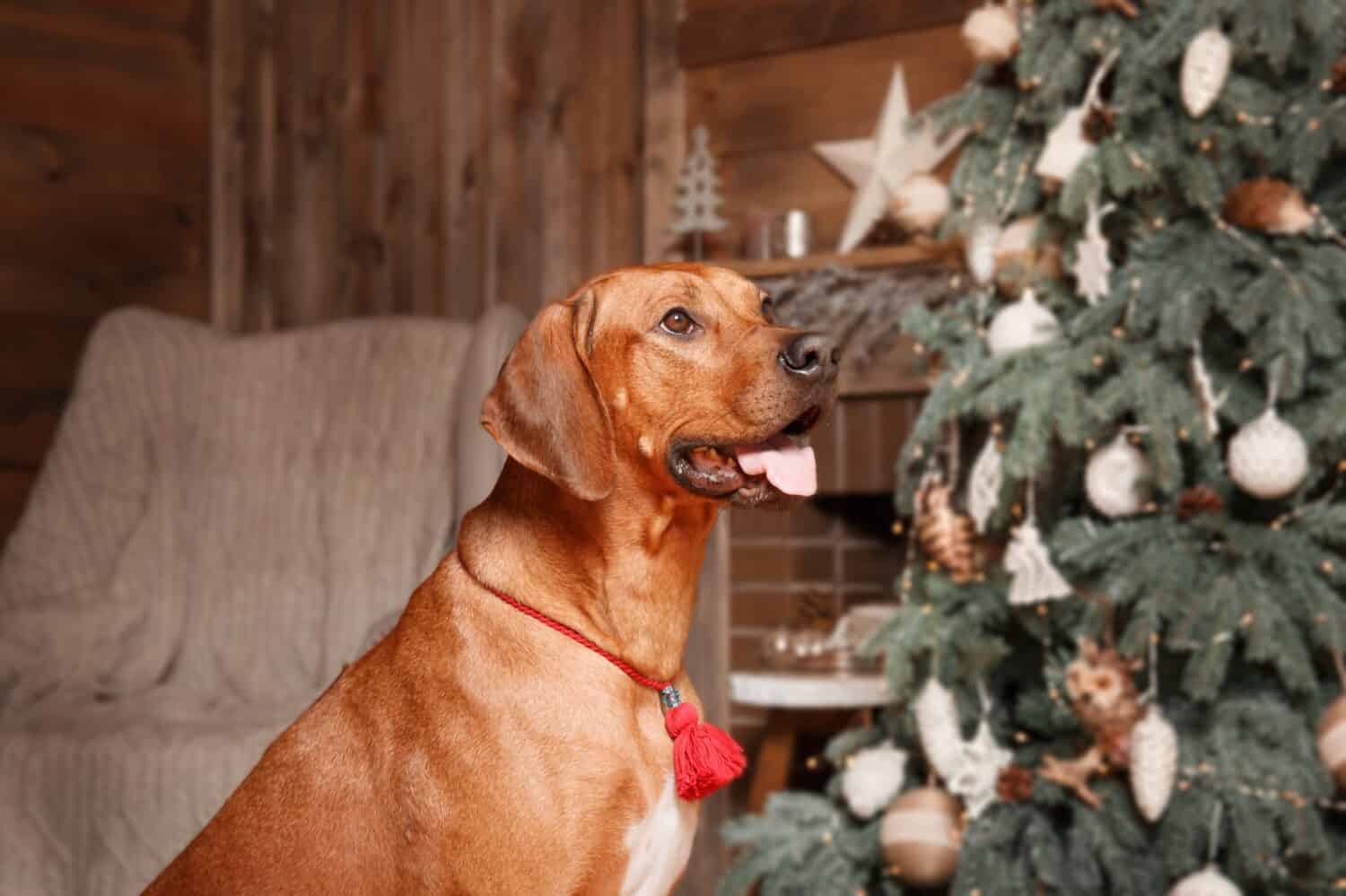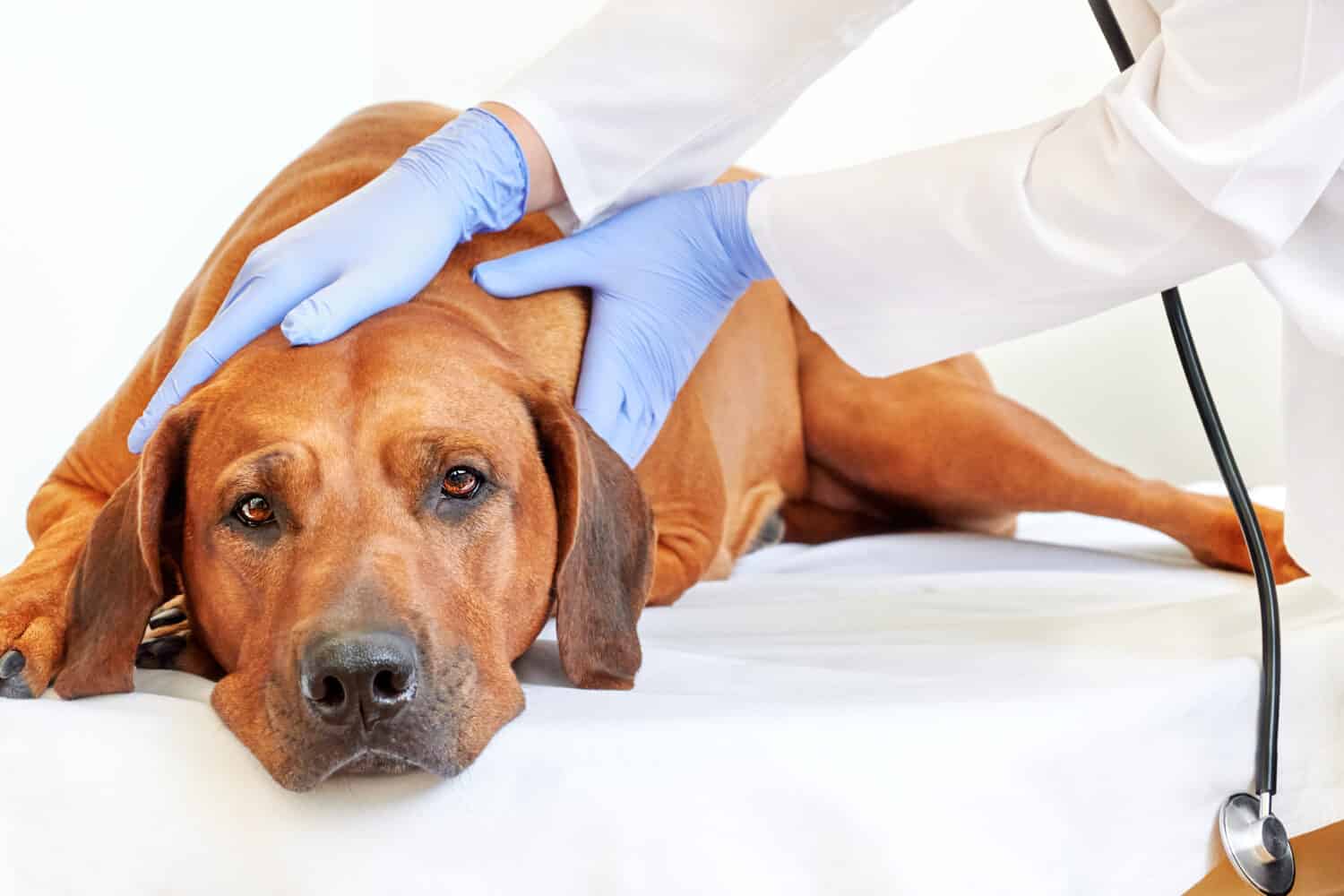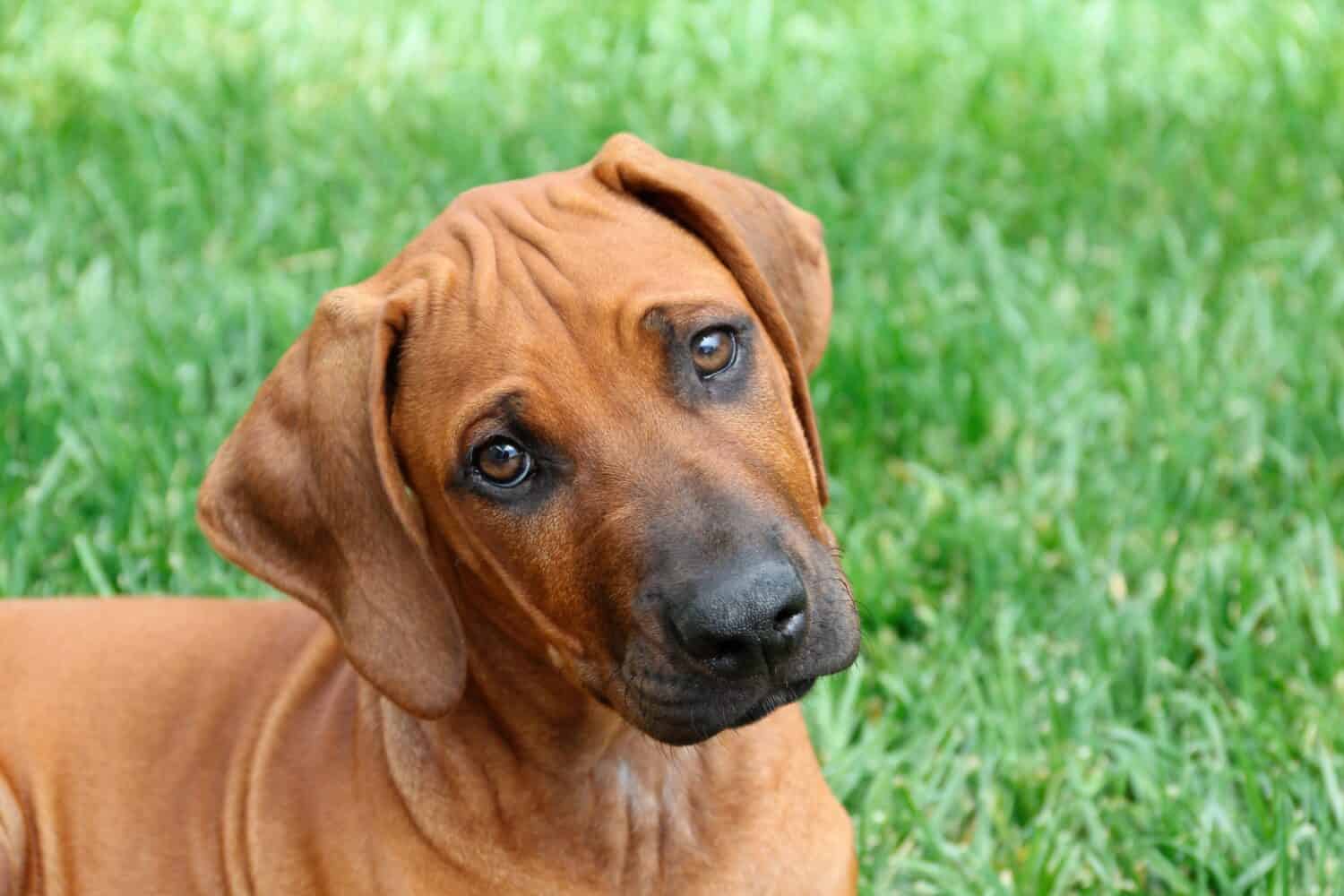A protective dog that loves your family as much as you do sounds like a dream. But are Rhodesian Ridgebacks good with kids? Learn more about this dog, including its temperament, social and exercise needs, and what you should consider before bringing a dog like this home!
Rhodesian Ridgebacks: A Bit About This Pooch
The Rhodesian Ridgeback is an affectionate dog that grows between 25 and 27 inches tall if male and between 24 and 26 inches tall if female. Males typically weigh around 85 pounds while females tend to weigh a little bit less at 70 pounds. The life expectancy of the Rhodesian Ridgeback is 10 to 12 years (but some have lived up to 15 years old!).
These dogs aren’t exactly self-willed, but they can be quite independent. They’re relatively easy to train. They are not an overly vocal type of dog, reserving their vocalizations for moments when they need to alert you of something. They’re neither high-energy nor couch potatoes; they fall somewhere in the middle of these two extremes.
These pups have several standard colors, ranging from light wheaten to wheaten and wheaten black nose. They may have a black mask and white markings on their coats. These pups are known for several features, one of which is a strip of backward-growing hair you can find right on its back. They were once hunting dogs in Africa and have retained their strong prey drive. However, today, they are welcomed into many family homes.
Rhodesian Ridgeback Temperament
According to the American Kennel Club, the Rhodesian Ridgeback is a rather even-keeled pup. These are affectionate dogs that belong to the hound group and that move in a rather dignified manner. Whereas some dogs may feel content relaxing in the home, the Rhodesian Ridgeback needs some kind of activity to keep it mentally stimulated.

©nik174/Shutterstock.com
These dogs are incredibly athletic, affectionate, and protective of their family members. But they can also demonstrate independent personalities, sometimes showing more of their dominant side. The Rhodesian Ridgeback isn’t the best choice for a first-time dog owner; however, if you are familiar with dog ownership, particularly with large, strong dogs, a Rhodesian Ridgeback can make an excellent pet.
Rhodesian Ridgeback Social and Exercise Needs
Rhodesian Ridgebacks are innately protective and remain vigilant. They can be a bit reserved with strangers and don’t immediately trust new people. Some dog breeds need a standard routine to thrive, but the Ridgeback is an adaptable dog. These dogs enjoy playtime but don’t need to play nonstop. They do shed a bit and require weekly grooming to keep their smooth coats healthy and lustrous.
They don’t drool nearly as much as other dogs and considering their athletic builds, you should expect to provide them with a moderate amount of exercise. This can occur during your play sessions, but you can also balance it out with daily walks. Consider providing them with a large enough space where they can run, whether it be an enclosed backyard or a dog park. They need these bursts of physical exertion to remain content. You may also consider incorporating other activities into your routine with a Ridgeback (like agility training, for example).
Are Rhodesian Ridgebacks Good With Kids?
Not only are Rhodesian Ridgebacks the types of dogs to dote on you and your family, but they’re also great with other dogs. They’re good even with young children! These are watchdogs that remain faithful to you and your family and display a protective nature around young children. However, you must train your pup from puppyhood to act appropriately around small children.
It’s equally important that small children understand how to interact with this dog. Considering their size and their sometimes excitable moods, they could accidentally knock over a smaller child. Ultimately, with proper training, you can have a wonderful family dog that is loving, affectionate, and protective.

©OlgaOvcharenko/Shutterstock.com
What to Consider Before Bringing a Rhodesian Ridgeback Home
Early Socialization
With a Rhodesian Ridgeback, early socialization is a must. Remember, these were bred as hunting dogs in Africa, so their prey drive remains strong. Starting at early puppyhood, a Rhodesian Ridgeback should be gently but firmly guided during socialization. These dogs thrive when they live indoors alongside their human counterparts. But you have to remember that as much as they are loving and affectionate, they need to get comfortable around humans and any other dogs you may have early on. This ensures that they grow up to become well-adjusted adult dogs.
Training
Along with early socialization, you may also consider puppy training classes. Unless you have the experience required to properly train a dog like this, you, your new pup, and your entire family would benefit from working with an experienced trainer. They can help your puppy develop into a well-mannered adult. These dogs can be independent and may sometimes display a domineering attitude, so you must know how to handle them properly both at home and when you are outdoors on long walks or visiting dog parks.
Physical Activity
Since the Rhodesian Ridgeback is an athletic dog with a strong history of hunting behavior, you can expect to provide this dog with plenty of exercise. It doesn’t have to be vigorous, but this dog does enjoy running. A Rhodesian Ridgeback is not the type of dog you can leave at home all day and night. They need to experience the outdoors and expel some of the energy they have through physical exercise. However, you can always incorporate playtime at home, which also helps keep this dog in good health and a positive mood.
Grooming Requirements
Luckily, you don’t need to worry about high-maintenance grooming with the Rhodesian Ridgeback. They do shed a little bit but overall, these pups do well with a weekly brushing session. This helps keep the coat shiny and removes any loose hair. You don’t have to bathe the Rhodesian Ridgeback often. An occasional bath works just fine with this dog. Aside from that, just make sure to keep your Rhodesian Ridgeback’s nails properly trimmed. The American Kennel Club offers insight to owners and states that this type of dog may have a better response to a nail grinder over a nail clipper.
Health Concerns
With a life span of up to 15 years, the Rhodesian Ridgeback doesn’t typically have a lot of health issues. So long as you procure your dog through a responsible breeder, you can rest assured that they’ve been screened for certain issues like hip dysplasia and any eye anomalies. You can work with your veterinarian starting from the first visit to ensure that you keep your pup in good health. This means proper vaccinations, detecting any conditions early on, ensuring nutrient-dense foods, and ensuring proper exercise.

©Zontica/Shutterstock.com
Veterinary Costs
Veterinary care is required for any type of pet you bring home. Either you can budget for expected veterinary costs, or you can consider a pet insurance policy to cover your dog from an early age. These policies may cover wellness visits and standard or routine care, or they may be solely for accident and illness protection. When you consider potential veterinary costs, it makes sense to purchase a policy that can give you peace of mind should the unexpected occur.
The image featured at the top of this post is ©synthetick/Shutterstock.com.
